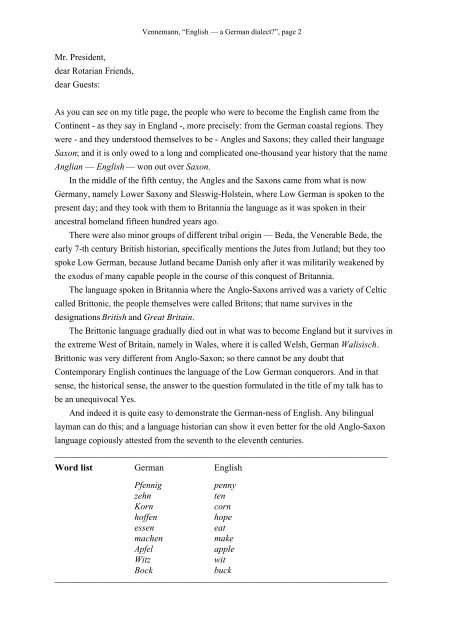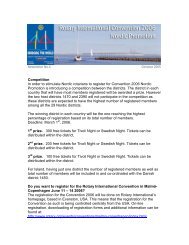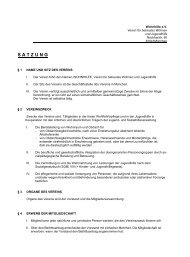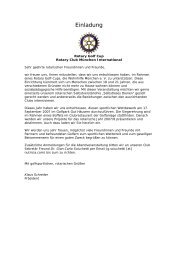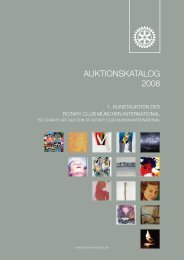English - a German dialect? - Rotary Club of Munich International
English - a German dialect? - Rotary Club of Munich International
English - a German dialect? - Rotary Club of Munich International
Create successful ePaper yourself
Turn your PDF publications into a flip-book with our unique Google optimized e-Paper software.
Mr. President,<br />
dear Rotarian Friends,<br />
dear Guests:<br />
Vennemann, “<strong>English</strong> — a <strong>German</strong> <strong>dialect</strong>?”, page 2<br />
As you can see on my title page, the people who were to become the <strong>English</strong> came from the<br />
Continent - as they say in England -, more precisely: from the <strong>German</strong> coastal regions. They<br />
were - and they understood themselves to be - Angles and Saxons; they called their language<br />
Saxon; and it is only owed to a long and complicated one-thousand year history that the name<br />
Anglian — <strong>English</strong> — won out over Saxon.<br />
In the middle <strong>of</strong> the fifth centuy, the Angles and the Saxons came from what is now<br />
<strong>German</strong>y, namely Lower Saxony and Sleswig-Holstein, where Low <strong>German</strong> is spoken to the<br />
present day; and they took with them to Britannia the language as it was spoken in their<br />
ancestral homeland fifteen hundred years ago.<br />
There were also minor groups <strong>of</strong> different tribal origin — Beda, the Venerable Bede, the<br />
early 7-th century British historian, specifically mentions the Jutes from Jutland; but they too<br />
spoke Low <strong>German</strong>, because Jutland became Danish only after it was militarily weakened by<br />
the exodus <strong>of</strong> many capable people in the course <strong>of</strong> this conquest <strong>of</strong> Britannia.<br />
The language spoken in Britannia where the Anglo-Saxons arrived was a variety <strong>of</strong> Celtic<br />
called Brittonic, the people themselves were called Britons; that name survives in the<br />
designations British and Great Britain.<br />
The Brittonic language gradually died out in what was to become England but it survives in<br />
the extreme West <strong>of</strong> Britain, namely in Wales, where it is called Welsh, <strong>German</strong> Walisisch.<br />
Brittonic was very different from Anglo-Saxon; so there cannot be any doubt that<br />
Contemporary <strong>English</strong> continues the language <strong>of</strong> the Low <strong>German</strong> conquerors. And in that<br />
sense, the historical sense, the answer to the question formulated in the title <strong>of</strong> my talk has to<br />
be an unequivocal Yes.<br />
And indeed it is quite easy to demonstrate the <strong>German</strong>-ness <strong>of</strong> <strong>English</strong>. Any bilingual<br />
layman can do this; and a language historian can show it even better for the old Anglo-Saxon<br />
language copiously attested from the seventh to the eleventh centuries.<br />
_________________________________________________________________________<br />
Word list <strong>German</strong> <strong>English</strong><br />
Pfennig penny<br />
zehn ten<br />
Korn corn<br />
h<strong>of</strong>fen hope<br />
essen eat<br />
machen make<br />
Apfel apple<br />
Witz wit<br />
Bock buck<br />
_________________________________________________________________________


